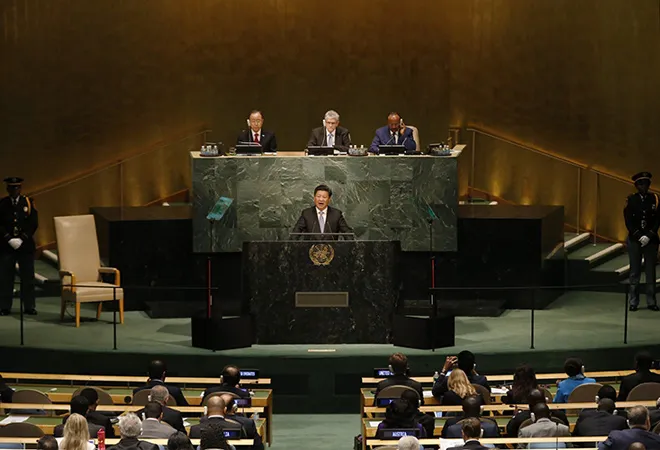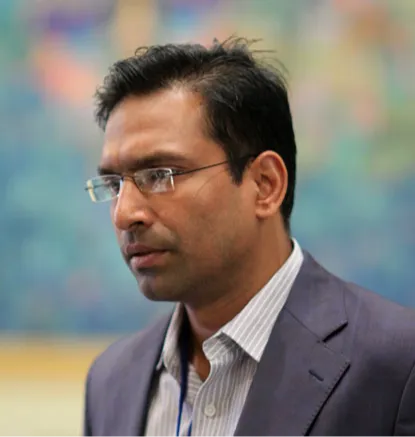 This is the forty fifth part in the series The China Chronicles
This is the forty fifth part in the series The China Chronicles.
Read all the articles here
Unlike the United States and the former Soviet Union, China has never tried to install regimes of its preference in foreign countries. For a long time, the Communist Party of China (CPC) never claimed its system of government has any universal appeal. Lately, this seems to be changing. Since its embrace to market capitalism in the late 1970s and unprecedented economic growth making it the second largest economy in less than four decades, the Middle Kingdom is steadily using its hard and soft tools to alter “self-imposed” restraints. Apart from spreading its “soft power” among the wider regions of Asia, Africa, and Europe, the country is using its economic might particularly through the Belt and Road Initiative (BRI) to promote its geopolitical interests in distant regions. What is worrisome, however, is the fact that China under Xi Jinping has little regard for democracy, human rights and universal liberal values. At a time when America and the West are “withdrawing” from their global commitment to democratic values, Xi and the Chinese Communist Party (CCP) are having an easy time to laugh at the liberal order and values that it stands for.
Hard selling the Chinese Model
According to Andrew Nathan, a well-known China expert “China encourages authoritarian regimes elsewhere by the power of example. By demonstrating that advanced modernisation can be combined with authoritarian rule, the Chinese regime has given hope to authoritarian rulers everywhere”. Further, China’s ability to execute major infrastructure projects such as high-speed rail networks in the shortest possible time without political hurdles has created many admirers as most Western democracies are gridlocked. The recent government shutdown in the US is a reminder.
The super efficiency of the Chinese state in executing big ticket projects and its ability to take swift decisions persuaded influential columnist Thomas Friedman to famously remark that US “could be China for a day” simply to get things done. The American political scientist Daniel Bell has written an effusive book praising the “meritocratic” advantages of Chinese political system. In short, while the Western liberal order is facing backlash and a crisis of legitimacy as citizens increasingly question its ability to deliver, the Chinese Model is gaining popularity across many regions of the world including America’s own backyard. More and more countries are embracing Chinese authoritarianism to increase growth and development. From Turkey, Poland to Hungary, there is a growing list of democracies that have developed a fascination for China’s “authoritarian capitalism”. For instance, Rodrigo Duterte, Philippines’s strongman has openly praised the Chinese model. Similarly, Viktor Orban, the Hungarian leader has been making fun of liberal democracy while seeking solace in Chinese style of governance. In other words, the Chinese Model is gaining traction in many regions including Africa and Latin America.
Installing friendly regimes?
The popularity of the Chinese Model has its own standing and promoted without any regard for an individual country’s democratic process and rule of law. In the past few years, there is alarming trends of the Chinese state and its agencies influencing and managing internal policies including the change of governments in a few cases. The most widely reported incident in recent times is the alleged role of China in the fall of Robert Mugabe regime in Zimbabwe.
Reuters revealed that Mugabe a long-time friend of China had become a liability for Beijing because of his indigenisation law debarring Chinese companies from getting majority ownership of State Owned Enterprises (SOEs). Beyond Zimbabwe, China has made deep inroads into other African democracies. Both Angola and Ethiopia have come under heavy Chinese influence including “regime change”.
Closer home, China has been working relentlessly to dislodge democracies in Taiwan and Macau. Beijing’s record of honouring democratic principles on its own territory Hong Kong has come under a heavy cloud with the rise of the Umbrella Movement in this former British colony. Activists and dissidents demanding better democratic rule in Hong Kong have been repressed and jailed by Beijing. With regard to Taiwan, apart from frequent threats of forcible reunification with the mainland, the Chinese government is using its huge trade and the Chinese Diaspora to check anti-Chinese and pro-democracy activities in this small island nation. For example, recently pro-China groups attacked leaders of the Umbrella Movement Nathan Law and Joshua Wong in Taiwan.
Beyond its own region, China’s interference has spread to its extended neighbourhood particularly in South East Asia. Over the years, China has spread its influence into Association of South East Asian Nations (ASEAN) largely in the form of business and investment. Most ASEAN countries earlier shared a strong relationship with the US and its Western allies have found it more profitable to do business with China, albeit with no pressure on maintaining democratic principles. Cambodia, Thailand and even Malaysia have been throwing away their “whatever democratic credentials” and drawing greater inspiration from China. Promoted and supported by China, Hun Sen, Cambodia’s strongman has been clamping down on democracy and basic freedoms by restricting the media and jailing opponents. Again, China is the only big country in the region, which has gone on to defend Myanmar in the United Nations Security Council (UNSC) and the Human Rights Council (HRC) on the Rohingya issue. The list gets even bigger especially if one includes the South Asian region.
For instance, China has a long shadow over the affairs of Pakistan and with the mega China Pakistan Economic Corridor (CPEC) initiative, literally no area of Pakistan’s politics, economy and society is out of China’s influence. China has made deep inroads into Nepal’s internal politics and democratic process. Recently, in an unprecedented interference in the country’s domestic politics, China went on to fund the local elections in Nepal. Other smaller nations in South Asia particularly Sri Lanka and Maldives are coming under growing Chinese pressure and politicians in these countries often consult Beijing for major decisions. In short, China has used its huge economic and strategic resources including infrastructural and technical expertise to influence and often “manage” political regimes to the great disadvantage of India – the region’s democracy powerhouse.
Meddle Country
Recently,
The Economist sarcastically referred to China as the "Meddle Country." The magazine’s categorisation was in response to a Fairfax Media and Australian Broadcasting Corporation (ABC) investigation revealing the role of the Communist Party of China (CPC) in monitoring 14000 Chinese students in Australia and its alleged role in trying to buy influence through political donations. In 2017, Sam Dastyari, an influential Labour Party MP had to resign from his position after it was revealed that a Chinese donor had paid for his bills including a settlement of his personal debt. Mr. Dastyari was lobbying peers to “respect” China’s claims in the South China Sea apart from persuading his party’s foreign affairs spokesperson to avoid meeting a pro-democracy activist in Hong Kong.
While the focus of press attention has been on Australia, China’s attempts to buy political influence abroad extends to other countries. For instance, the CPC meddling in the internal politics of New Zealand recently rocked the country’s Parliament. As extensively reported by
Financial Times, a Chinese-born member of New Zealand’s parliament serving on the country’s key parliamentary select committee on foreign policy, defence and trade had evidently spent 15 years in Chinese military intelligence.
Even the United States is not insulated from Chinese meddling. The U.S.’ media and influential members of the Congress have been debating the growing influence of hundreds of Confucius Institutes and overseas Chinese students and business. For instance, over the last one decade, China has set up some 1,000 Confucius Institutes in 120 countries and hundreds of them are in the US. They are directly funded by the Chinese government’s outreach arm. Complaining about growing Chinese interference in the U.S, the Congressional Executive Commission on China chaired by Senator Marco Rubio hosted a public hearing titled “The Long Arm of China: Exporting Authoritarianism with Chinese Characteristics.”
Attack on Human Rights
While the Chinese regime is known to be utterly contemptuous of human rights, becoming more pronounced in recent times. China displayed this more vividly recently when it defended the Burmese regime’s “brutal and systematic attempt to cleanse an entire ethnic minority” at the UNSC. In another clear display of its rising profile and contempt for human rights, China used its influence to prevent hundreds of Non-Governmental Organisations (NGOS) from attending President Xi Jinping’s speech at the United Nations (UN) in January this year. Similarly, China used its influence to eject Dolkun Isa, well-known Uyghur minority activist from speaking at UN.
As has been extensively documented by Human Rights Watch (HRW), in growing number of instances Chinese officials have been harassing activists, primarily those from China, by photographing and filming them on UN premises in violation of rules and restricting their travel to Geneva. According to HRW, China in good measure has used its membership in the Economic and Social Council’s NGO Committee to block civil society organisations from getting UN accreditation. The country has sought to blacklist accredited human rights activists and deprive funding for the UN’ rights officers.
Beyond the UN, the Chinese state has launched an all out war against democracy and human rights activists in Taiwan, Hong Kong and even Cambodia. Recently, China jailed Lee Ming-Che, a visiting Taiwanese democracy activist for five years by the Chinese court for discussing democracy on social media. Similarly, since 2012 a number of democracy activists from Hong Kong have been jailed for demanding greater freedom. Recently, it incarcerated democracy icon Joshua Wong a second time for three months.
The above illustrates a growing Chinese challenge to the liberal democratic order and universal values. While there is no need to panic, the liberal democracies cannot simply wish away the growing threats emerging from the illiberal behemoth. China’s carefully camouflaged soft power supported by a massive financial power and its growing appeal as an alternative model through the “power of example” has many admirers among new democracies and authoritarian regimes. With the United States, the biggest promoter of democracy and human rights in retreat and the European Union experiencing an existential battle, it uncertain how the liberal order can check the rise of the Chinese authoritarian model. The quadrilateral alliance between four major democracies – India, the US, Japan and Australia might place a check on China’s disruptive influence over democracies and universal values.
The views expressed above belong to the author(s). ORF research and analyses now available on Telegram! Click here to access our curated content — blogs, longforms and interviews.



 This is the forty fifth part in the series The China Chronicles.
Read all the articles
This is the forty fifth part in the series The China Chronicles.
Read all the articles  PREV
PREV


